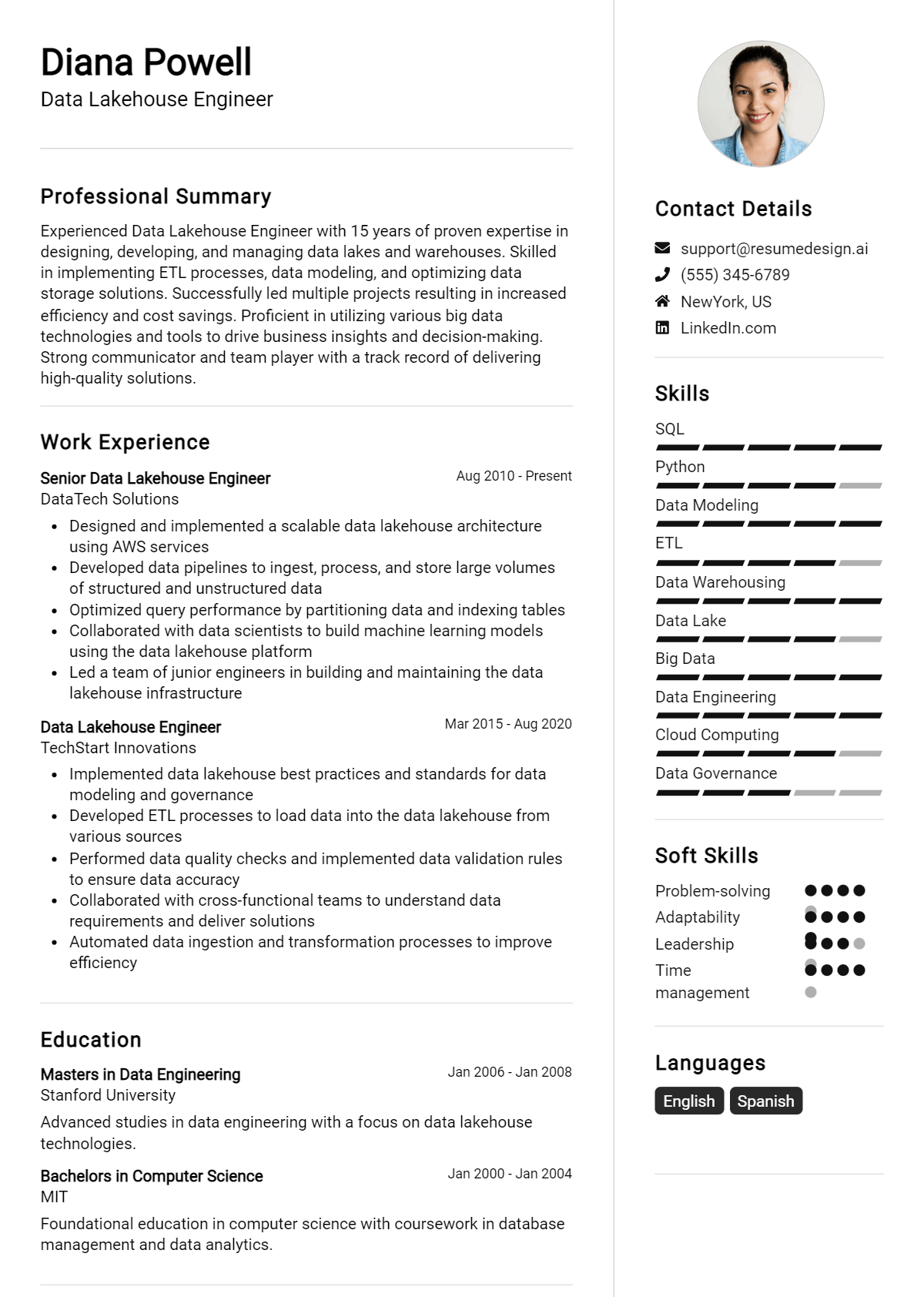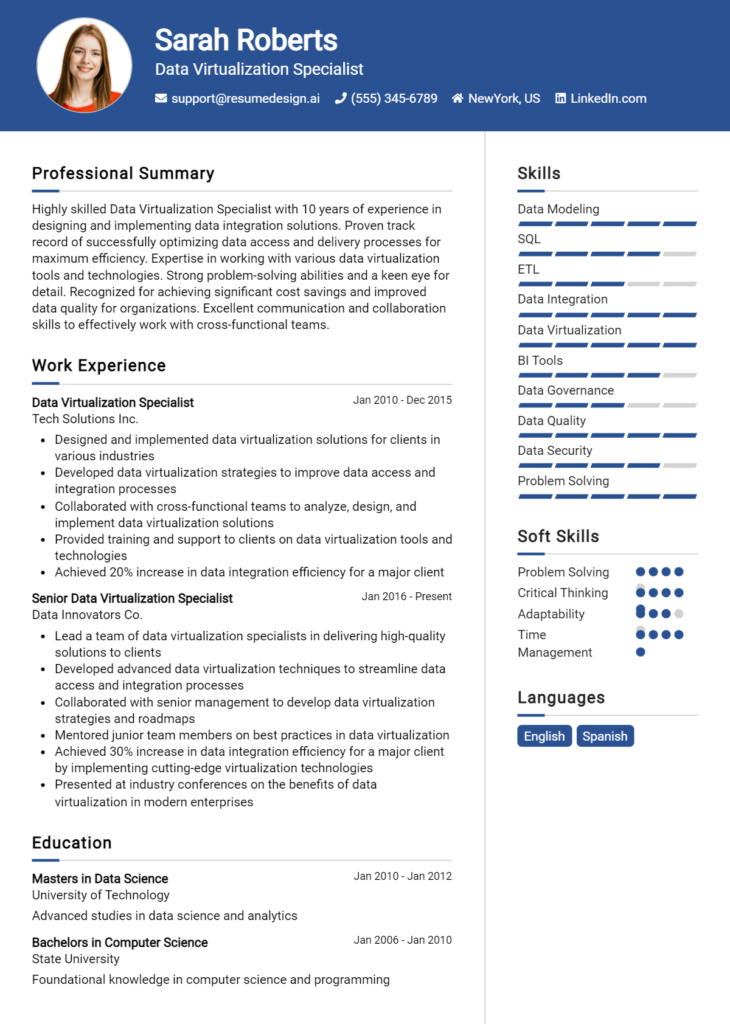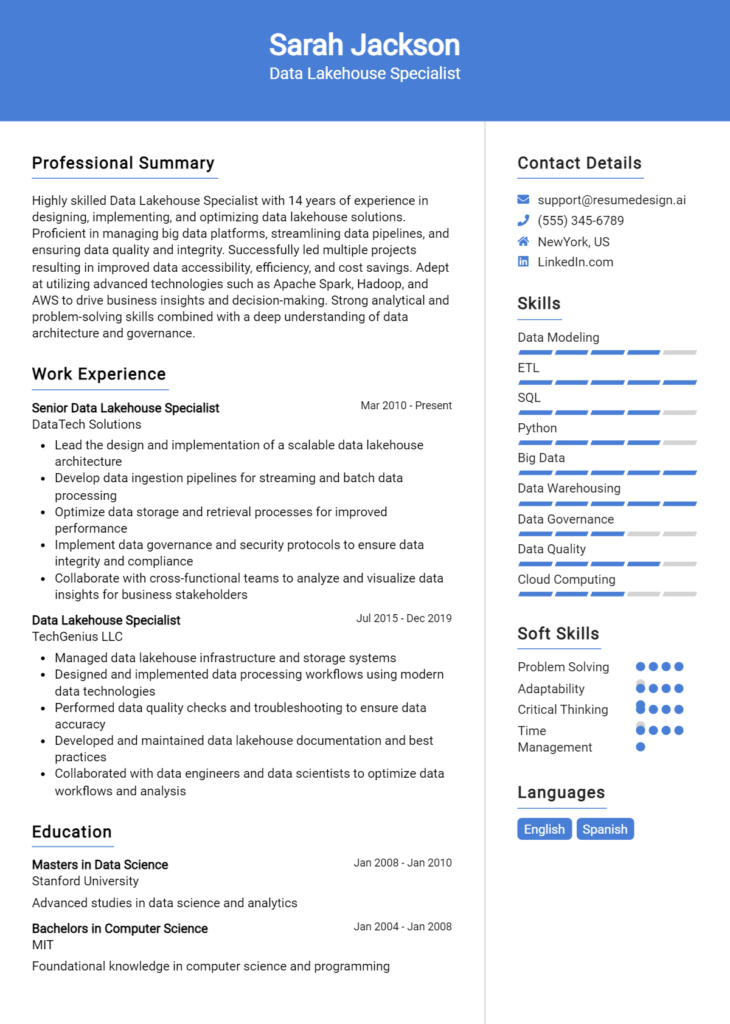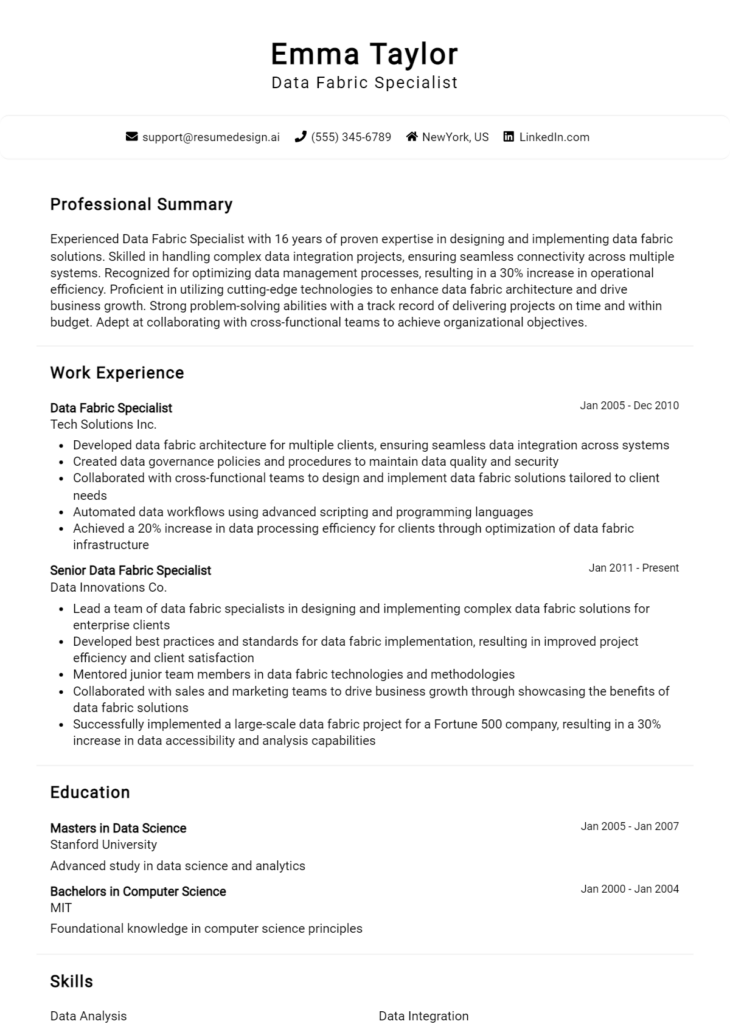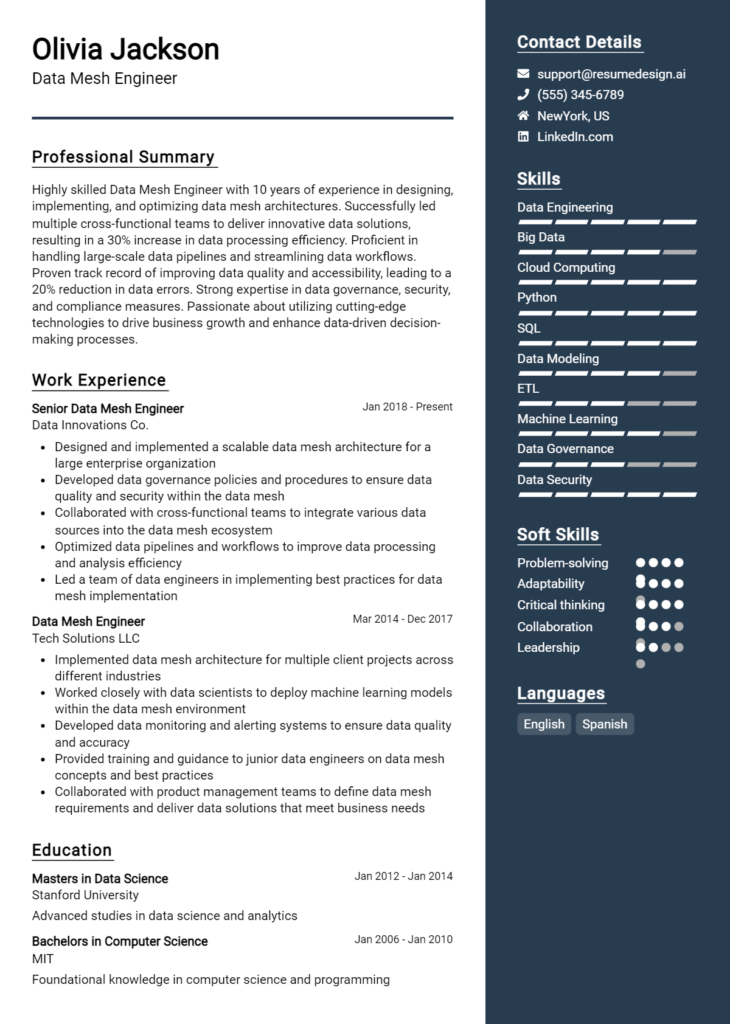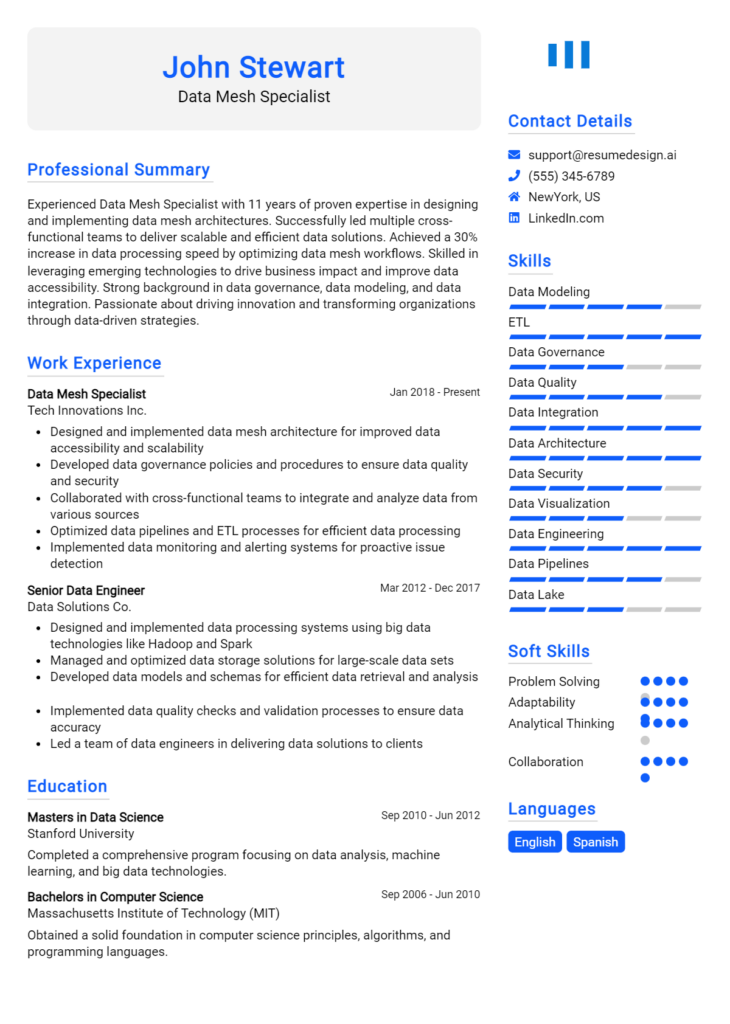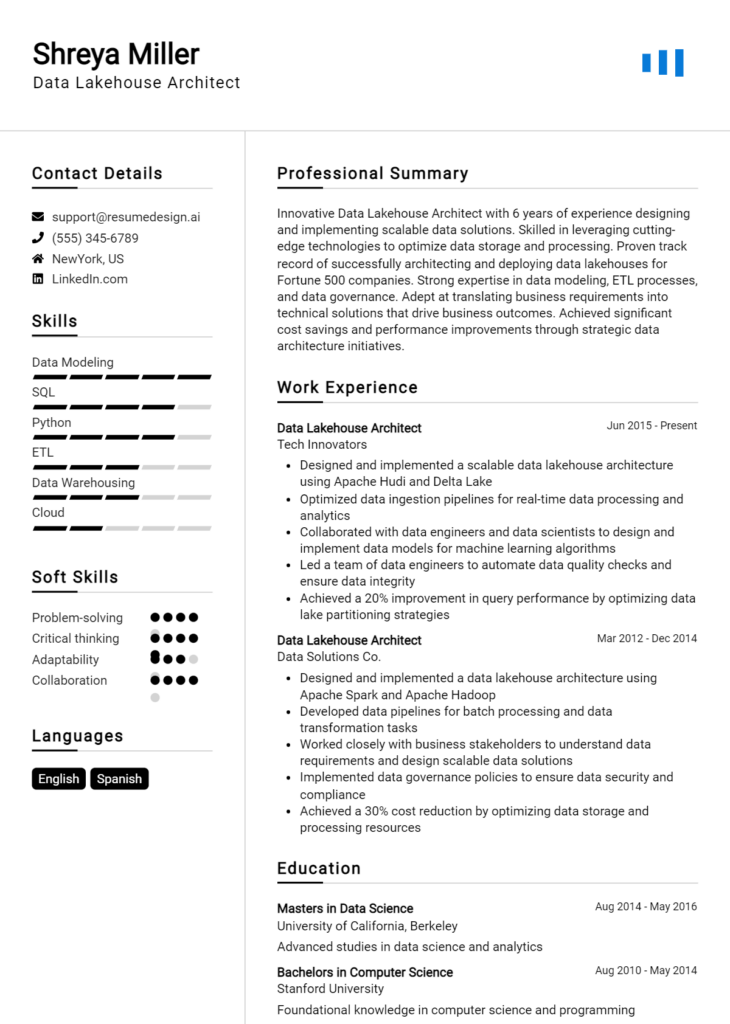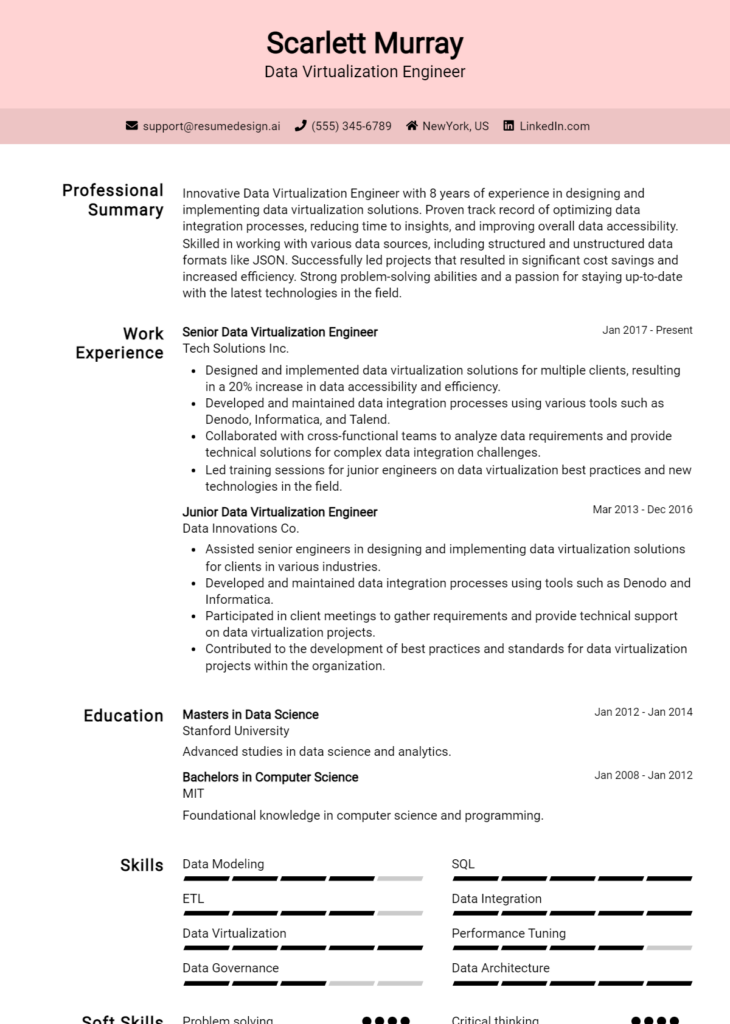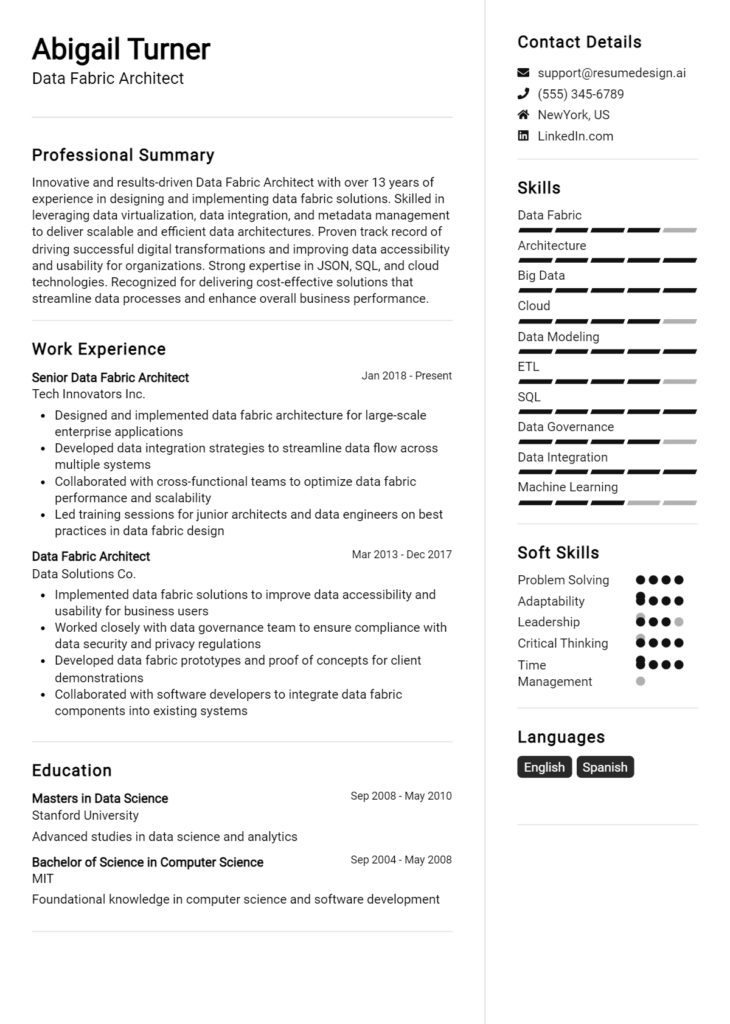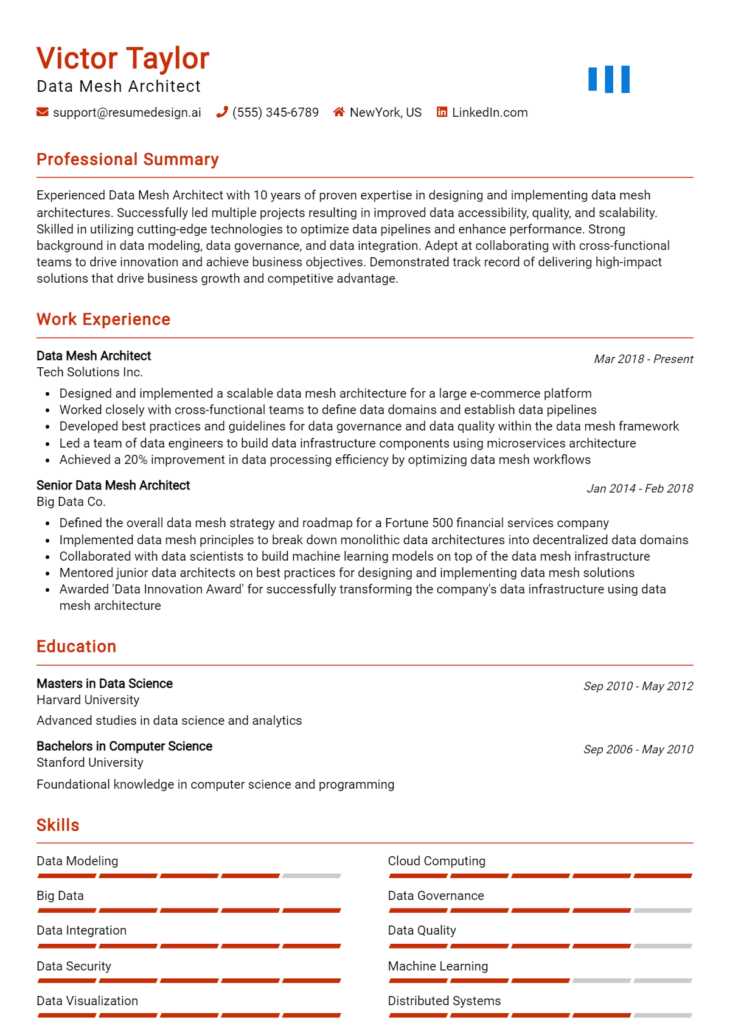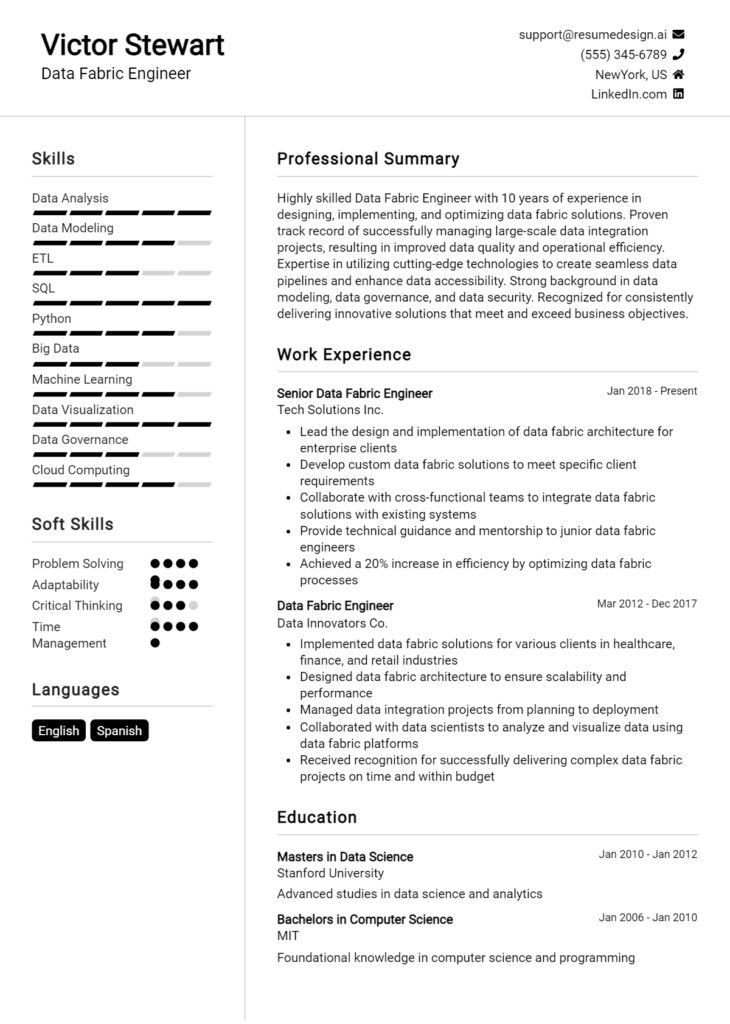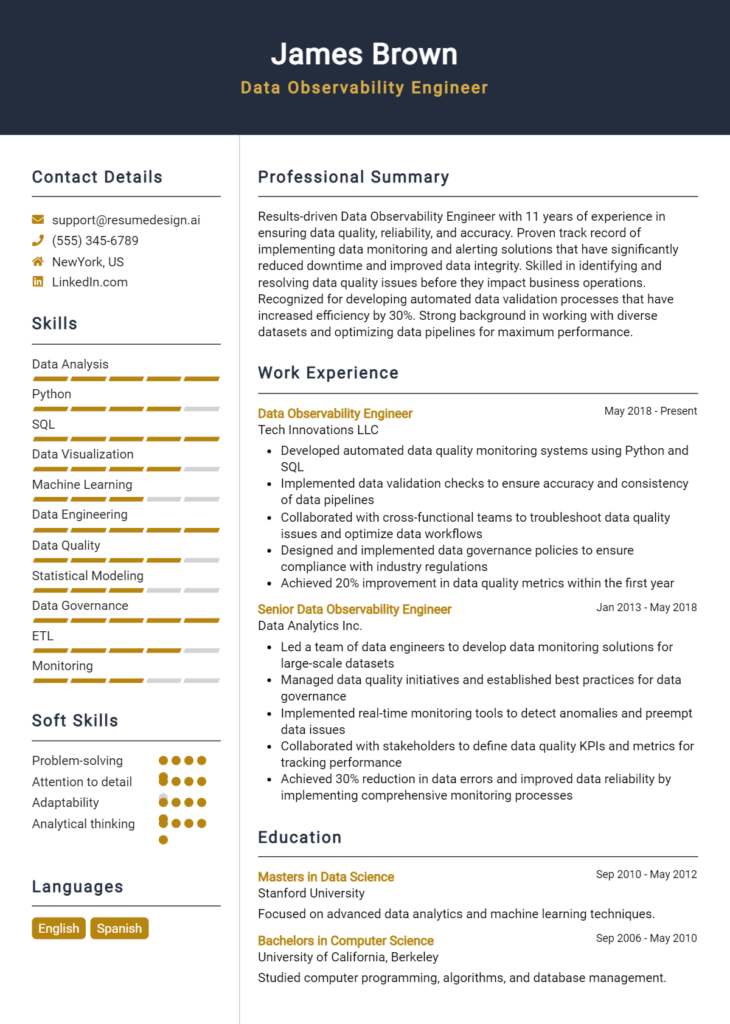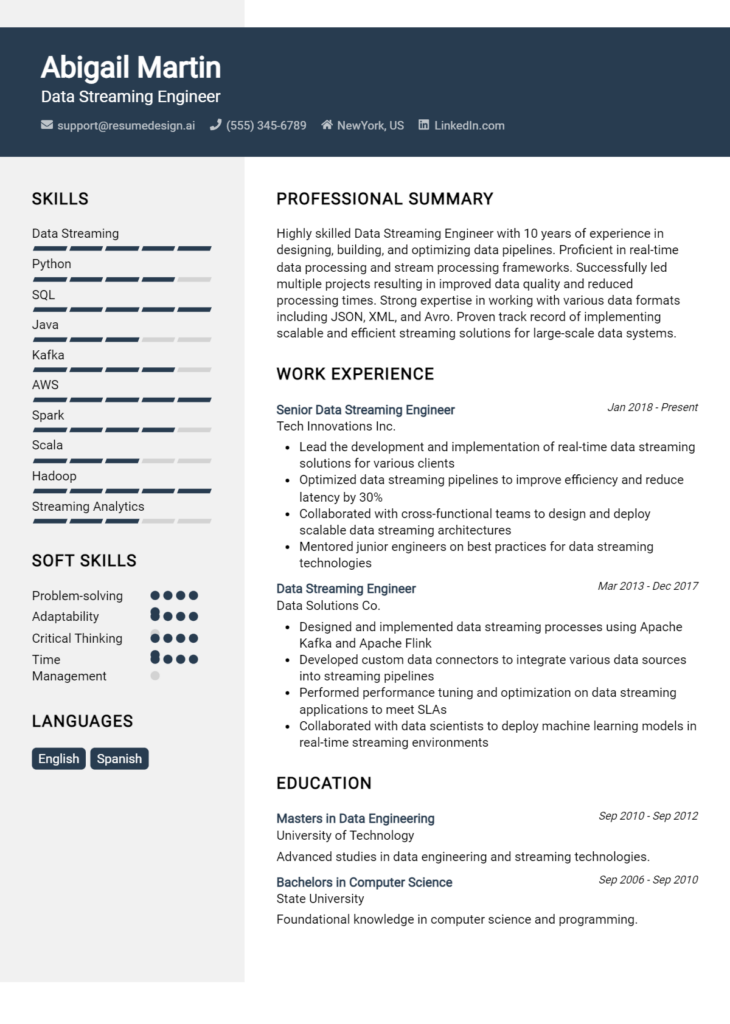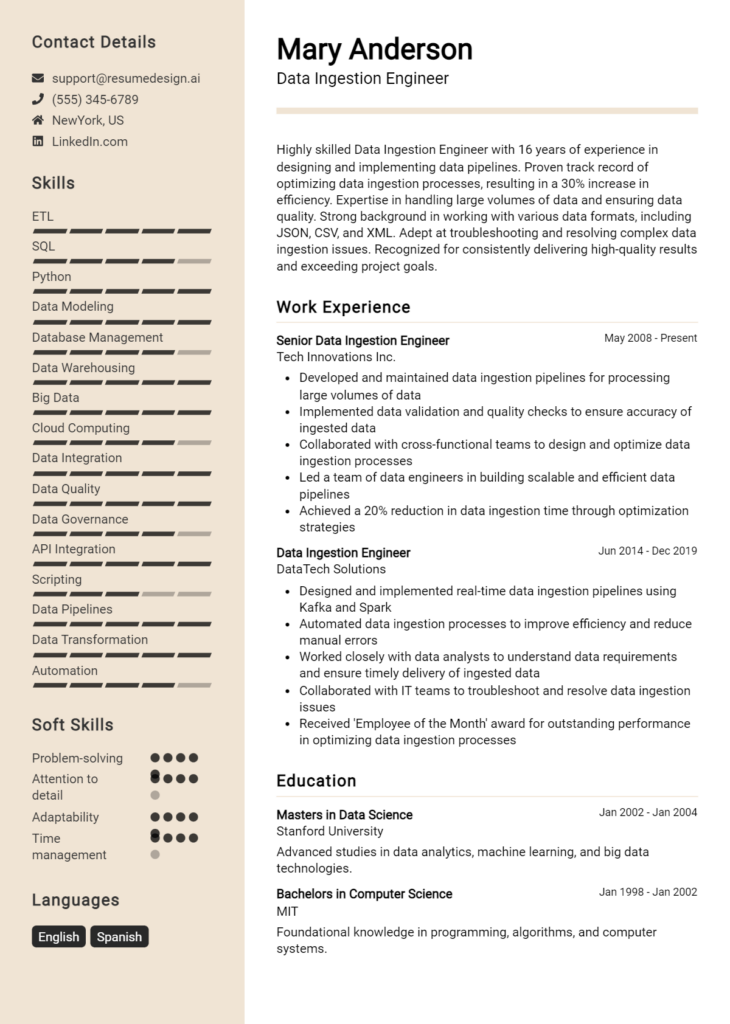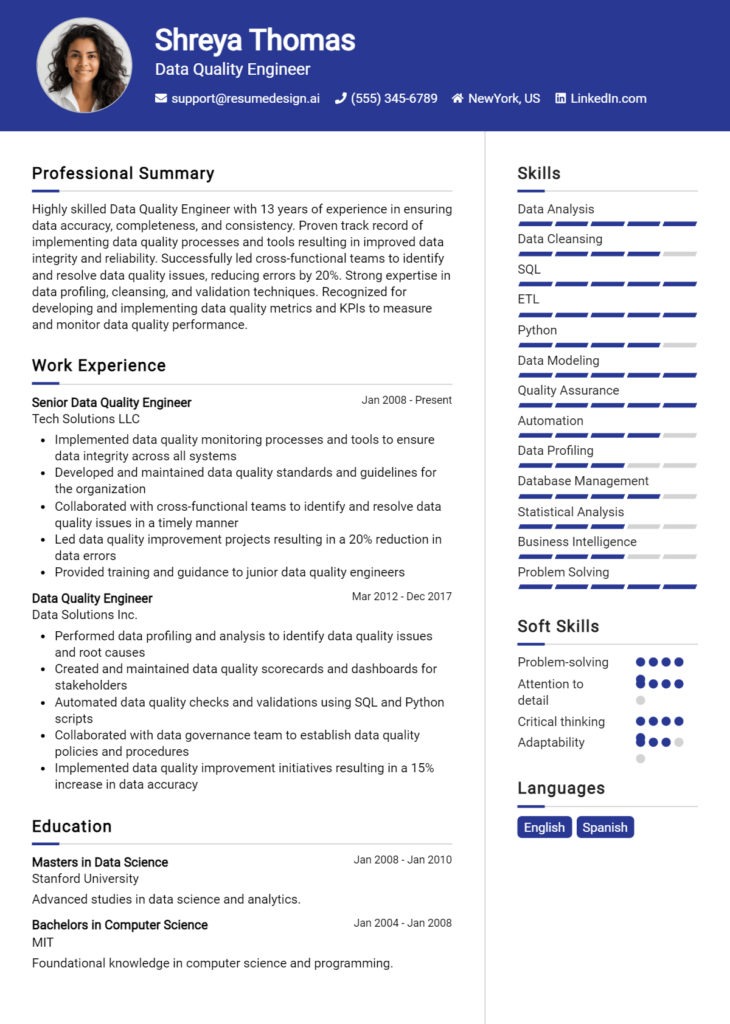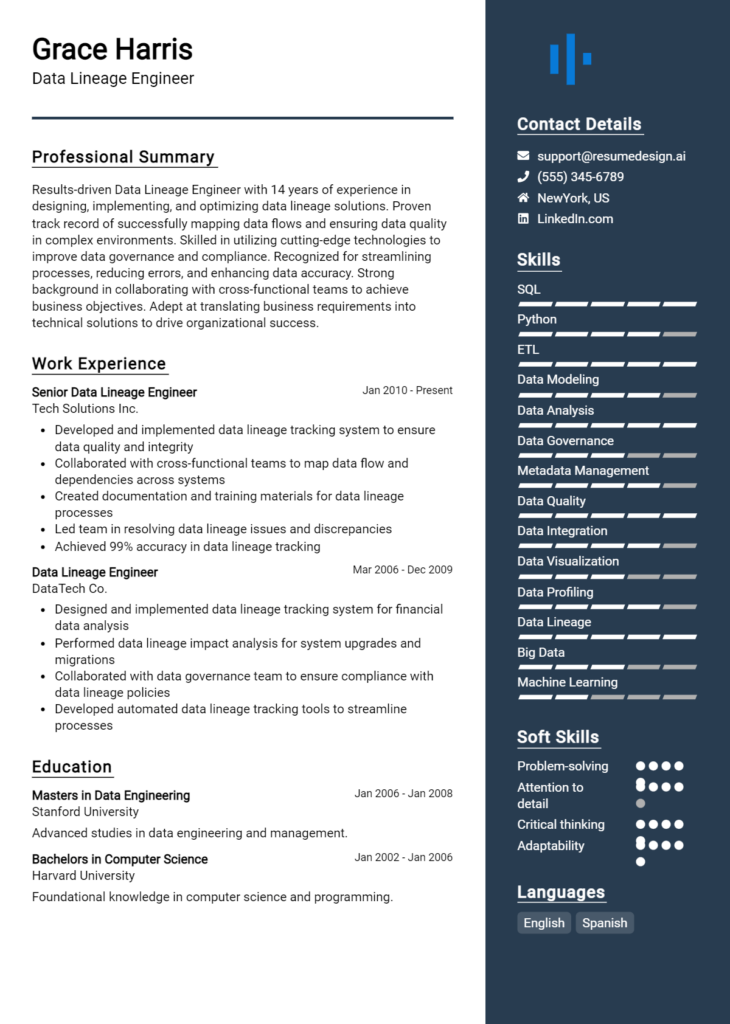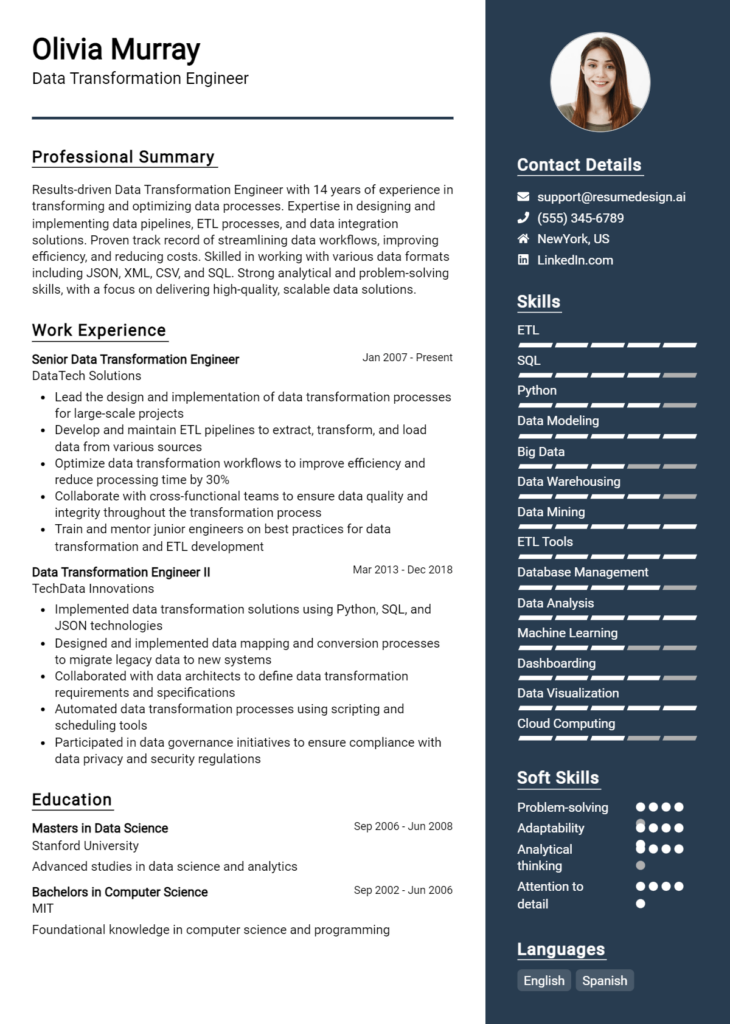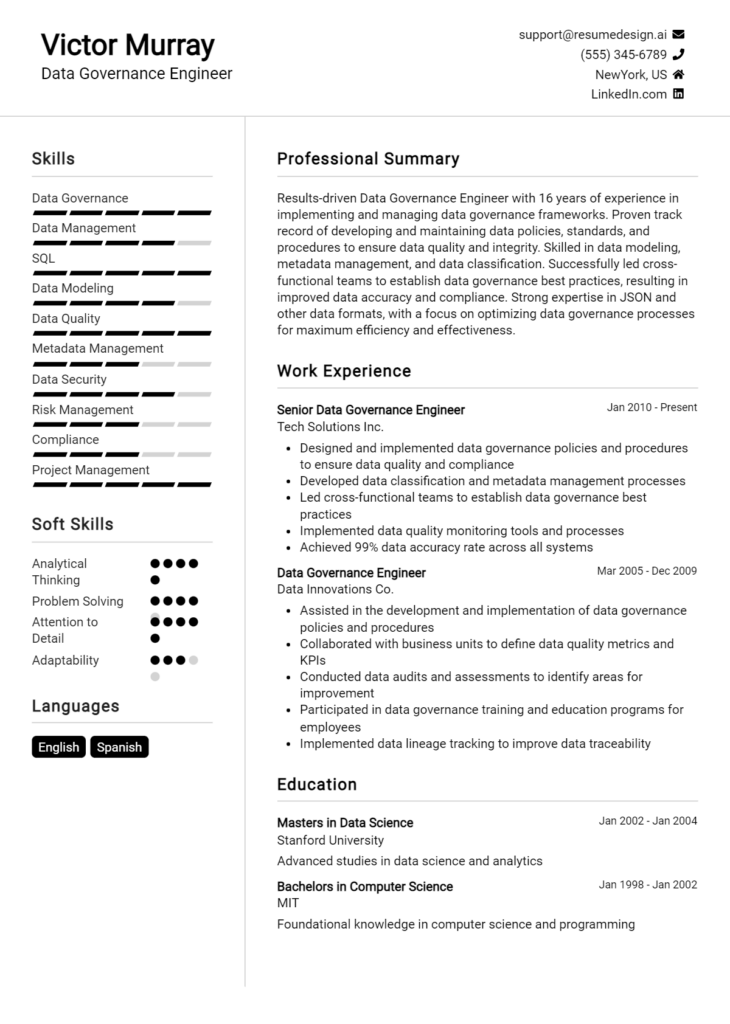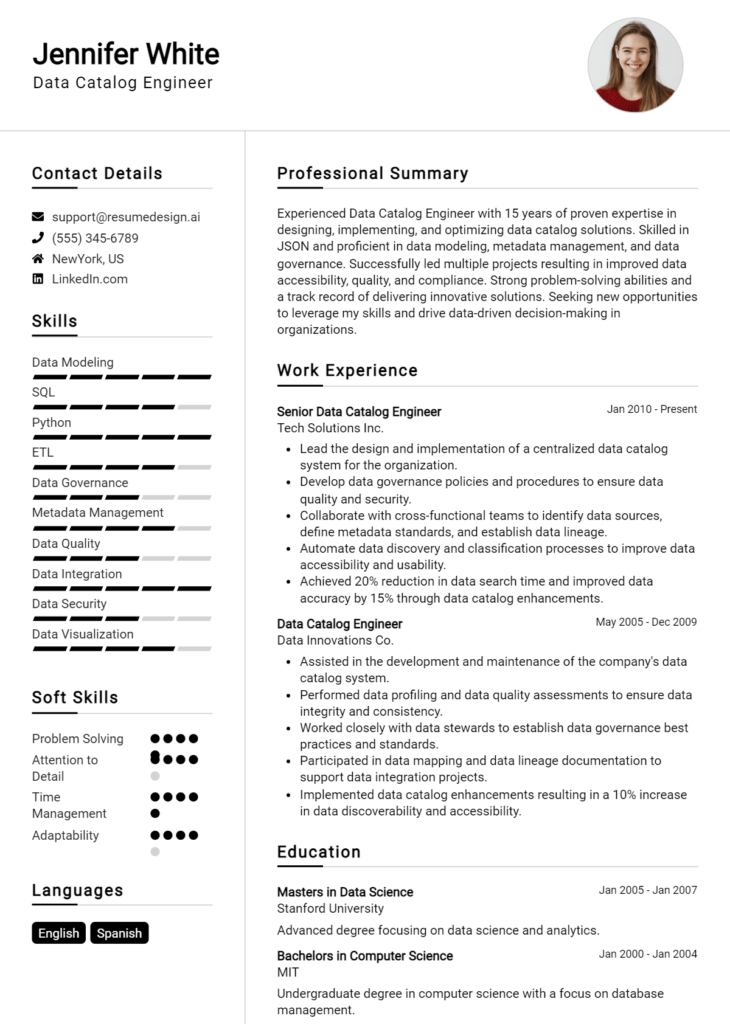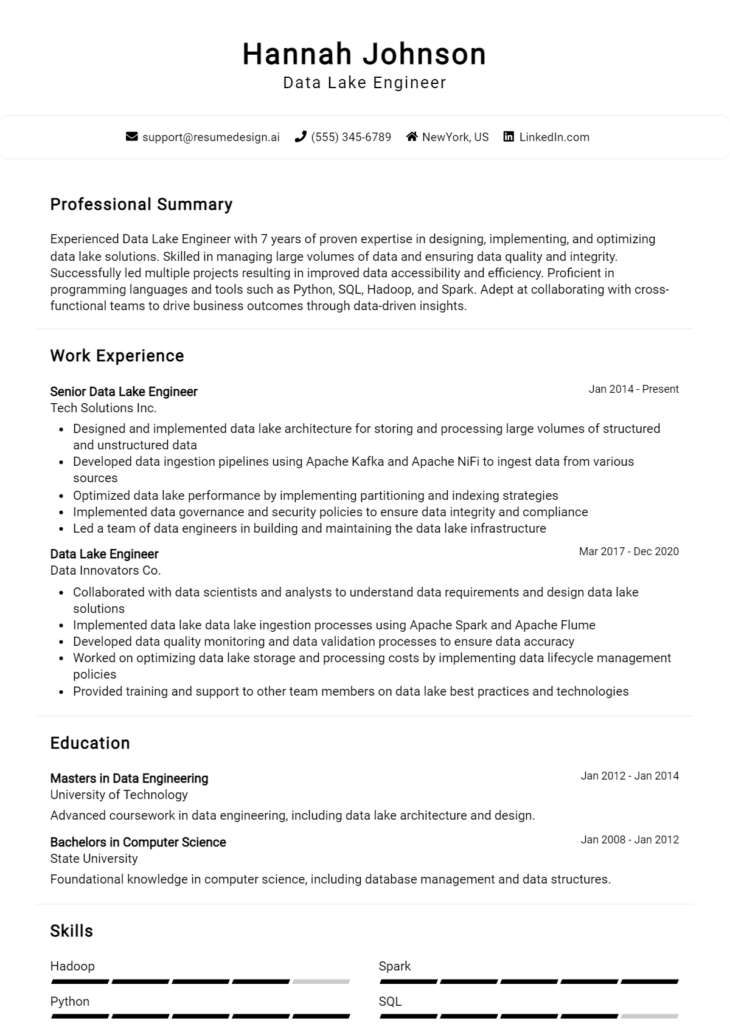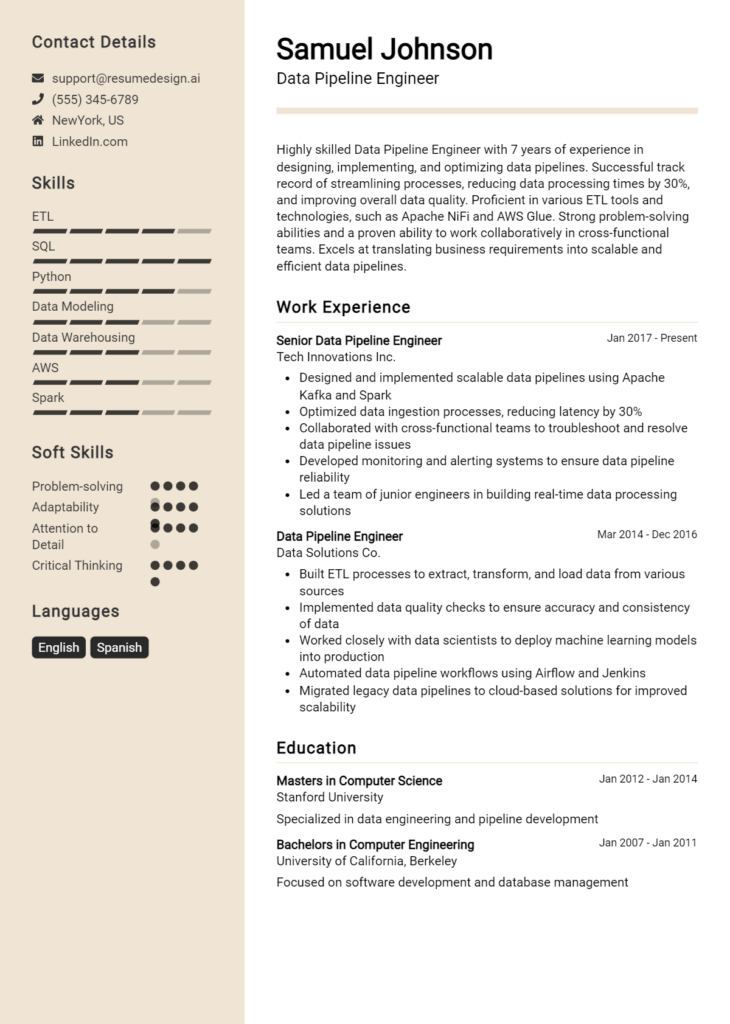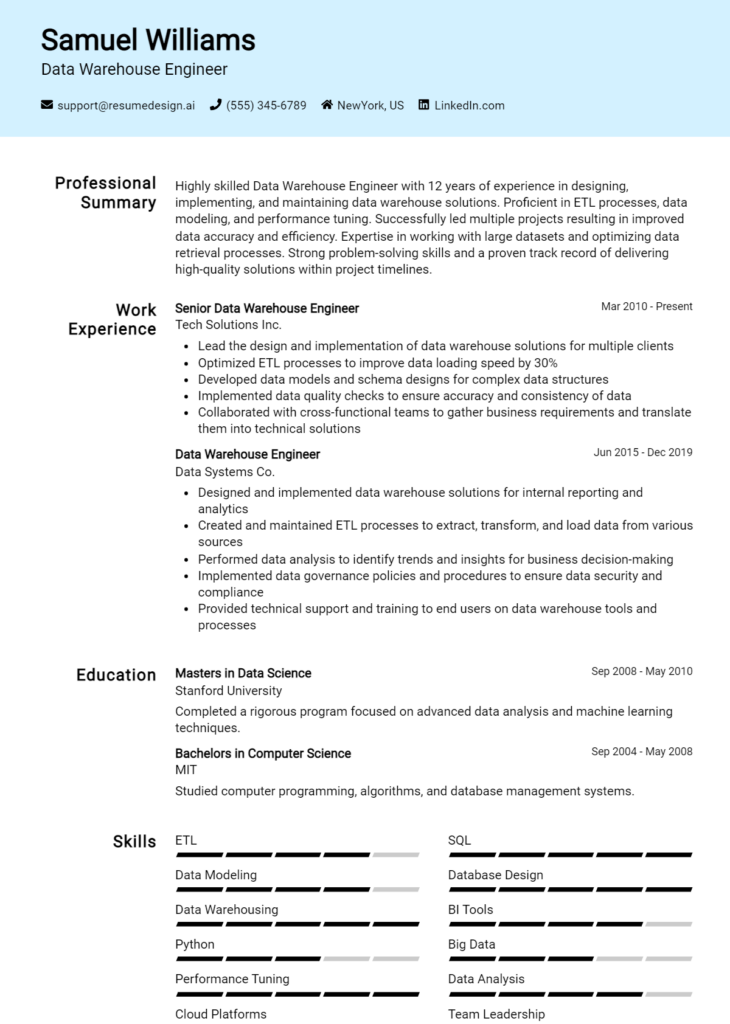Data Lakehouse Engineer Core Responsibilities
A Data Lakehouse Engineer plays a crucial role in merging data engineering and analytics by designing and managing robust data lakehouse architectures. This professional collaborates across departments, ensuring seamless data integration and accessibility, which enhances decision-making processes. Key skills include proficiency in SQL, data modeling, cloud platforms, and strong problem-solving capabilities. A well-structured resume highlighting these qualifications is essential, as it demonstrates how the engineer contributes to achieving the organization's strategic goals.
Common Responsibilities Listed on Data Lakehouse Engineer Resume
- Design and implement data lakehouse architecture to support analytics and reporting.
- Integrate data from various sources into the lakehouse environment.
- Optimize data storage and retrieval processes for efficiency.
- Collaborate with data scientists and analysts to define data requirements.
- Ensure data quality and integrity through validation and cleansing processes.
- Monitor and troubleshoot performance issues in the data pipeline.
- Implement security measures to protect sensitive data.
- Document data workflows and processes for future reference and training.
- Stay updated with emerging technologies in data engineering and analytics.
- Provide technical support and guidance to cross-functional teams.
- Participate in data governance initiatives to ensure compliance with regulations.
High-Level Resume Tips for Data Lakehouse Engineer Professionals
In today's competitive job market, a well-crafted resume is essential for Data Lakehouse Engineer professionals looking to make a lasting impression on potential employers. Your resume often serves as the first point of contact, and it must effectively convey not only your technical skills and expertise but also your significant achievements in the field. A compelling resume can set you apart from the competition, highlighting your unique value proposition as a Data Lakehouse Engineer. This guide aims to equip you with practical and actionable resume tips tailored specifically for your profession, ensuring that your resume stands out in the eyes of hiring managers.
Top Resume Tips for Data Lakehouse Engineer Professionals
- Tailor your resume to the specific job description, using relevant keywords and phrases that align with the employer's requirements.
- Showcase your experience with tools and technologies commonly used in data lakehouse environments, such as Apache Spark, Delta Lake, or cloud platforms like AWS and Azure.
- Quantify your achievements by using metrics and data points, such as performance improvements, cost savings, or successful project completions.
- Highlight your understanding of data architecture, ETL processes, and data governance to demonstrate your comprehensive skill set.
- Include certifications or relevant training courses that exhibit your commitment to professional development in data engineering and analytics.
- Utilize a clean, professional format that is easy to read, ensuring that key information stands out and is quickly accessible.
- Incorporate project experience that illustrates your ability to design and implement data solutions in a lakehouse architecture.
- Emphasize soft skills such as problem-solving, teamwork, and communication, as these are crucial for collaboration in data-driven environments.
- Keep your resume concise, ideally one page, focusing on the most relevant information that aligns with the job you're applying for.
- Proofread your resume multiple times to eliminate any grammatical errors or typos, as attention to detail is vital in engineering roles.
By implementing these tips, you can significantly enhance your resume and increase your chances of landing a job in the Data Lakehouse Engineer field. A well-structured and targeted resume not only showcases your technical prowess but also demonstrates your understanding of the industry's demands, making you a more attractive candidate to potential employers.
Why Resume Headlines & Titles are Important for Data Lakehouse Engineer
In the competitive landscape of data engineering, having a well-crafted resume headline or title is crucial for a Data Lakehouse Engineer. This brief yet impactful phrase serves as the first impression for hiring managers, immediately capturing their attention and summarizing a candidate's key qualifications. An effective headline should be concise, relevant, and tailored to the specific job being applied for, ensuring that it reflects the candidate’s expertise in data lakehouse technologies and practices. A strong title not only highlights the candidate's strengths but also sets the tone for the rest of the resume, making it easier for recruiters to see the value a candidate could bring to their organization.
Best Practices for Crafting Resume Headlines for Data Lakehouse Engineer
- Keep it concise: Aim for one impactful sentence or phrase.
- Be role-specific: Clearly identify your position as a Data Lakehouse Engineer.
- Highlight key skills: Incorporate technical skills relevant to the role.
- Showcase experience: Mention years of experience or notable achievements.
- Use industry terminology: Utilize keywords that resonate within the data engineering field.
- Focus on impact: Indicate how your contributions have led to successful outcomes.
- Customize for each application: Tailor your headline for the specific job description.
- Maintain professionalism: Use formal language suitable for a corporate environment.
Example Resume Headlines for Data Lakehouse Engineer
Strong Resume Headlines
"Results-Driven Data Lakehouse Engineer with 5+ Years of Experience in Cloud Solutions"
“Innovative Data Lakehouse Specialist Skilled in ETL Processes and Data Integration”
“Experienced Data Lakehouse Engineer with Proven Track Record in Data Governance and Analytics”
Weak Resume Headlines
“Engineer Looking for Job”
“Data Professional”
The strong headlines effectively communicate the candidate's specific expertise and experience, making them immediately relevant to hiring managers. They incorporate key elements such as years of experience, technical skills, and a focus on results, which resonate well with recruiters looking for qualified candidates. On the other hand, the weak headlines fail to impress due to their vague nature and lack of specificity. They do not convey any unique qualifications or strengths, making it difficult for hiring managers to recognize the candidate's potential contributions to their organization.
Writing an Exceptional Data Lakehouse Engineer Resume Summary
A well-crafted resume summary is a crucial element for a Data Lakehouse Engineer, as it serves as the first impression for hiring managers. This brief introduction effectively captures their attention by succinctly highlighting the candidate's key skills, relevant experience, and notable accomplishments in the field. A strong summary not only showcases the candidate’s technical abilities and knowledge of data lakehouse architecture but also emphasizes their capacity to solve complex data challenges. Being concise and impactful, it should be tailored specifically to the job description, ensuring that it resonates with the needs of potential employers and stands out in a competitive hiring landscape.
Best Practices for Writing a Data Lakehouse Engineer Resume Summary
- Start with a strong opening statement that encapsulates your experience and expertise.
- Quantify achievements where possible to demonstrate the impact of your work.
- Focus on key skills relevant to the Data Lakehouse Engineer role, such as data modeling, ETL processes, and cloud technologies.
- Tailor your summary to match the specific job description, using keywords from the posting.
- Keep it concise; aim for 3-5 sentences that deliver maximum information.
- Highlight any relevant certifications or technologies that set you apart.
- Use action-oriented language to convey a sense of proactivity and results-driven mindset.
- Avoid jargon and overly technical language; ensure it is accessible to all hiring managers.
Example Data Lakehouse Engineer Resume Summaries
Strong Resume Summaries
Results-driven Data Lakehouse Engineer with over 7 years of experience in designing and implementing scalable data architectures. Led a project that reduced data processing time by 30% through the optimization of ETL pipelines, utilizing AWS and Apache Spark.
Detail-oriented Data Lakehouse Engineer adept at integrating data from multiple sources into cohesive data lake solutions. Achieved a 40% increase in data retrieval efficiency by developing advanced indexing strategies and leveraging machine learning algorithms.
Innovative Data Lakehouse Engineer with a proven track record of building robust data pipelines and lakehouse architectures. Successfully migrated legacy systems to a cloud-based data lake, resulting in a 25% reduction in storage costs and improved data accessibility for analytics.
Weak Resume Summaries
Experienced data engineer with knowledge of various data technologies. Looking for a new opportunity to apply skills in data management.
Data professional with experience in handling data projects. Interested in working in a challenging environment.
The examples of strong resume summaries are effective because they include specific achievements, quantify results, and directly relate to the responsibilities of a Data Lakehouse Engineer. They showcase the candidate's experience and the impact of their work in a concise manner. In contrast, the weak summaries are vague, lacking detail and measurable outcomes, which fails to engage hiring managers or illustrate the candidates’ capabilities in a meaningful way.
Work Experience Section for Data Lakehouse Engineer Resume
The work experience section is a critical component of a Data Lakehouse Engineer resume, as it provides a detailed account of the candidate's professional journey and technical competencies. This section not only highlights the engineer's proficiency in data management and engineering tools but also emphasizes their ability to lead teams and deliver high-quality data products. By quantifying achievements and aligning work experience with industry standards, candidates can effectively demonstrate their value to potential employers, showcasing a proven track record in optimizing data architectures and enhancing data accessibility.
Best Practices for Data Lakehouse Engineer Work Experience
- Clearly outline technical skills used in each project, such as SQL, Python, and data pipeline technologies.
- Quantify achievements with metrics, such as percentage improvements in data processing times or cost savings.
- Highlight leadership roles and team management experiences to demonstrate capability in guiding projects.
- Include collaboration with cross-functional teams to show adaptability and communication skills.
- Use action verbs to begin bullet points, making the descriptions more impactful and dynamic.
- Tailor experience descriptions to align with the specific job description and industry standards.
- Focus on significant projects that demonstrate innovation and problem-solving abilities.
- Keep the language concise and professional, ensuring clarity and readability for hiring managers.
Example Work Experiences for Data Lakehouse Engineer
Strong Experiences
- Led a team of 5 engineers to design and implement a data lakehouse architecture that improved data retrieval speeds by 40%, resulting in enhanced analytics capabilities for the organization.
- Developed and deployed a real-time data processing pipeline using Apache Spark, which reduced data latency by 60% and improved decision-making processes across departments.
- Collaborated with data scientists and analysts to create a unified data model, increasing data accessibility by 50% and enabling self-service analytics for 100+ users.
- Managed the migration of legacy data systems to a lakehouse solution, resulting in a 30% reduction in operational costs and improved data governance.
Weak Experiences
- Worked on various data projects without specifying roles or outcomes.
- Assisted in data-related tasks, but did not quantify any contributions or results.
- Involved in team meetings to discuss data issues without detailing specific responsibilities or achievements.
- Participated in the deployment of data systems but lacked follow-up on performance metrics or improvements.
The examples provided illustrate the differences between strong and weak experiences. Strong experiences are characterized by clear, quantifiable outcomes and specific roles that showcase technical skills and leadership capabilities. These experiences convey a sense of impact and relevance to potential employers. In contrast, weak experiences lack detail, fail to quantify achievements, and do not clearly articulate the individual's contributions, making them less compelling in a competitive job market.
Education and Certifications Section for Data Lakehouse Engineer Resume
The education and certifications section of a Data Lakehouse Engineer resume is crucial for establishing the candidate’s foundational knowledge and commitment to professional development in a rapidly evolving field. This section not only reflects the academic background necessary for understanding complex data architectures but also showcases industry-relevant certifications that validate the candidate's skills. By including pertinent coursework, specialized training, and certifications, candidates can significantly enhance their credibility and demonstrate their alignment with the requirements of the role, reinforcing their qualifications to potential employers.
Best Practices for Data Lakehouse Engineer Education and Certifications
- Prioritize relevant degrees such as Computer Science, Data Engineering, or Information Systems.
- Include industry-recognized certifications like AWS Certified Data Analytics or Google Professional Data Engineer.
- Highlight any specialized training in data lakehouse technologies, such as Delta Lake or Apache Spark.
- List relevant coursework that demonstrates knowledge of data architecture, ETL processes, and big data technologies.
- Maintain an organized format that clearly separates degrees, certifications, and additional training.
- Update the section regularly to include new certifications or courses completed.
- Consider including affiliations with professional organizations that focus on data engineering and analytics.
- Be concise yet detailed, ensuring that each entry directly relates to the skills and knowledge required for a Data Lakehouse Engineer.
Example Education and Certifications for Data Lakehouse Engineer
Strong Examples
- Bachelor of Science in Computer Science, University of Technology, 2020
- AWS Certified Data Analytics – Specialty, 2021
- Certificate in Big Data Technologies, Data Institute, 2022
- Relevant Coursework: Data Warehousing, Advanced SQL, Cloud Computing, and Data Mining
Weak Examples
- Associate Degree in General Studies, Community College, 2018
- Certification in Microsoft Office Suite, 2019
- High School Diploma, 2016
- Online Course in Photography, 2021
The strong examples are considered effective as they directly relate to the skills and knowledge required for a Data Lakehouse Engineer, showcasing relevant degrees and certifications that reflect the candidate's technical expertise. In contrast, the weak examples lack relevance to the data engineering field and do not demonstrate any specific expertise or advanced knowledge in data lakehouse technologies, making them less impactful for potential employers.
Top Skills & Keywords for Data Lakehouse Engineer Resume
A well-crafted resume is essential for a Data Lakehouse Engineer, as it serves as a gateway to showcasing your expertise and experience in this rapidly evolving field. The right skills not only highlight your technical capabilities but also demonstrate your ability to solve complex problems, collaborate with cross-functional teams, and adapt to new technologies. Employers are increasingly seeking professionals who can navigate the intricacies of data management, analytics, and cloud technologies. Therefore, emphasizing both hard and soft skills in your resume can significantly enhance your chances of landing an interview. For more insights into presenting your qualifications effectively, explore our resources on skills and work experience.
Top Hard & Soft Skills for Data Lakehouse Engineer
Soft Skills
- Analytical Thinking
- Problem Solving
- Communication Skills
- Team Collaboration
- Adaptability
- Time Management
- Attention to Detail
- Creativity
- Critical Thinking
- Project Management
Hard Skills
- Data Modeling
- SQL and NoSQL Databases
- ETL (Extract, Transform, Load) Processes
- Cloud Platforms (AWS, Azure, GCP)
- Data Warehousing Solutions
- Data Governance and Security
- Apache Spark and Hadoop
- Machine Learning Fundamentals
- Python and R Programming
- Version Control (Git)
Stand Out with a Winning Data Lakehouse Engineer Cover Letter
Dear Hiring Manager,
I am writing to express my interest in the Data Lakehouse Engineer position at [Company Name]. With a strong background in data engineering and a passion for innovative data solutions, I am excited about the opportunity to contribute to your team. My experience in developing and optimizing data architectures, coupled with my expertise in both data lakes and data warehouses, positions me well to help [Company Name] leverage its data assets for strategic insights and business growth.
In my previous role at [Previous Company Name], I successfully designed and implemented a robust data lakehouse architecture that enabled seamless data integration and analytics. By utilizing tools such as Apache Spark and Delta Lake, I was able to streamline data processing workflows and improve query performance by over 40%. Additionally, my collaborative efforts with cross-functional teams ensured that data governance and quality standards were upheld, resulting in enhanced reliability and user trust in the data being reported. I am eager to bring this hands-on experience to [Company Name] and help drive impactful data initiatives.
Furthermore, I am well-versed in cloud platforms such as AWS and Azure, where I have deployed scalable data solutions that cater to dynamic business needs. My proficiency in SQL, Python, and data modeling allows me to work effectively with both structured and unstructured data, enabling the creation of comprehensive data pipelines. I am particularly drawn to [Company Name] because of its commitment to innovation and excellence in the data space, and I am excited about the prospect of contributing to projects that push the boundaries of what is possible with data.
Thank you for considering my application. I look forward to the opportunity to discuss how my skills and experiences align with the needs of your team. I am enthusiastic about the possibility of contributing to [Company Name] and helping you achieve your data-driven goals.
Sincerely,
[Your Name]
[Your LinkedIn Profile]
[Your Contact Information]
Common Mistakes to Avoid in a Data Lakehouse Engineer Resume
When crafting a resume for a Data Lakehouse Engineer position, it's crucial to present your skills and experiences in a way that aligns with industry expectations. Unfortunately, many candidates fall into common pitfalls that can undermine their chances of landing an interview. Avoiding these mistakes can significantly enhance your resume's effectiveness and showcase your qualifications more clearly. Here are some common missteps to steer clear of:
Vague Job Descriptions: Failing to provide specific details about your previous roles can leave hiring managers unclear about your actual contributions and expertise. Be precise about your responsibilities and achievements.
Ignoring Relevant Skills: Not highlighting essential skills like data modeling, ETL processes, or cloud technologies can be detrimental. Tailor your skills section to reflect the tools and technologies listed in the job description.
Lack of Quantifiable Achievements: Simply stating your duties without quantifying your impact can weaken your resume. Use metrics and data to demonstrate how your contributions improved system performance or reduced costs.
Overloading with Technical Jargon: While it's important to showcase your technical expertise, excessive jargon can alienate non-technical recruiters. Balance technical terms with clear explanations to ensure your resume is accessible.
Inconsistent Formatting: A disorganized or inconsistent layout can distract from your qualifications. Use uniform fonts, bullet points, and headings to create a clean, professional appearance.
Omitting Soft Skills: Data Lakehouse Engineers need strong communication and collaboration abilities. Failing to include soft skills can make your resume seem one-dimensional. Highlight how you've successfully worked in teams or communicated technical concepts to non-technical stakeholders.
Not Tailoring for Each Application: Sending out a generic resume for every position can backfire. Customize your resume for each job application to emphasize the most relevant experiences and skills for that specific role.
Neglecting to Include Continuous Learning: In a field as dynamic as data engineering, not mentioning ongoing education or certifications can be a missed opportunity. Highlight relevant courses, certifications, or self-study initiatives that demonstrate your commitment to professional development.
Conclusion
As a Data Lakehouse Engineer, your role is pivotal in bridging the gap between data management and analytics. Throughout this article, we've explored the essential skills and responsibilities that define this position, including expertise in data architecture, proficiency in cloud technologies, and a strong understanding of data processing frameworks.
Moreover, we discussed the importance of collaboration with data scientists and engineers to ensure that the data lakehouse effectively supports business intelligence and analytics efforts. Familiarity with tools like Apache Spark, Delta Lake, and SQL is crucial, as is the ability to implement data governance and security measures.
In conclusion, if you're aiming to secure a position as a Data Lakehouse Engineer or looking to advance in your career, it's essential to present a polished and effective resume. Take a moment to review your current resume and consider utilizing resources that can enhance your job application. Explore various resume templates to find a design that suits your style, or use the resume builder for a user-friendly way to create a standout resume. Additionally, check out resume examples for inspiration and ensure your cover letter complements your resume with cover letter templates. Start refining your application today and take the next step in your Data Lakehouse Engineer career!

